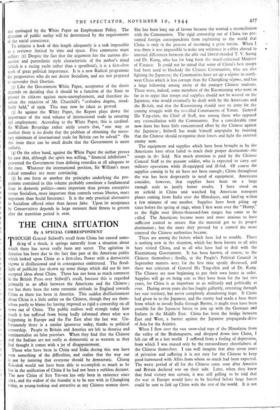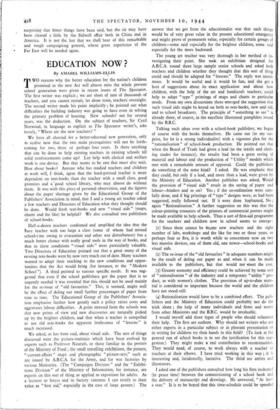THE CHINA SITUATION
By A SPECIAL CORRESPONDENT
THOUGH General Stilwell's recall from China has caused some- thing of a shock, it springs naturally from a situation about which there has never really been any secret. The agitation in America has been due to the fact that part of the American public which looked upon China as a first-class Power with a democratic regime is disillusioned and in consequence embittered. The flood- light of publicity has shown up some things which did not fit into accepted ideas about China. There has not been as much comment in the British Press over Stilwell's recall, because this is regarded primarily as an affair between the Americans and the Chinese ; nor has there been the same romantic attitude in England towards China as there has been in America. This sudden disillusionment about China is a little unfair on the Chinese, though they are them- selves partly to blame for having imposed so rigid a censorship on all news out of China. The public realises well enough today how niuch it has suffered from being badly informed about what was happening in Europe and the Far East after the last war. Un- fortunately there is a similar ignorance today, thanks to political censorship. People in Britain and America are left to theorise and sentimentalise on false premises. When they find that the Chinese and the Indians are not really as democratic or as western as they had thought it comes with a jar of disappointment.
Those who have been in China and India during this war have seen something of the difficulties, and realise that the way out is not by insisting that everyone should be democratic. Chiang Kai-shek would not have been able to accomplish as much as he has in the unification of China if he had not been a ruthless dictator. The new China of Sun Yat-sen has only been in existence since 19rx, and the widovf of the founder is to be met with in Chungking today, as young-looking and attractive as any Chinese woman there.
She has been long out of favour because she wanted a reconciliation with the Communists. The rigid censorship out of China has pre- vented foreign correspondents from explaining to the world that China is only in the process of becoming a great nation. When I was there it was impossible to make any reference in cables abroad to internal differences between the able and liberal-minded T. V. Soong and Dr. Kung, who has for long been the much-criticised Minister of Finance. It could not be stated that some of China's best troops had been used to blockade the Chinese Communists, who are also fighting the Japanese; the Communists have set up a regime in north- west China which is less corrupt than the Chungking regime, and has a large following among many of the younger Chinese students. There were, indeed, some members of the Kuomintang who went as far as to argue that troops and supplies should not be wasted on the Japanese, who would eventually be dealt with by the Americans and the British, and that the Kuomintang should save its army for the coming struggle with the so-called Communists of Yenan. General Ho Ying-chin, the Chief of Staff, was among those who opposed any reconciliation with the Communists. For a considerable time now there has been little concentrated effort by the Chinese against the Japanese ; Stilwell has made himself unpopular by insisting that the Chinese should reorganise their forces and fight the external enemy now.
The equipment and supplies which have been brought in by the Americans have often failed to reach their proper destination—the troops in the field. Not much attention is paid by the Chinese General Staff to the peasant soldier, who is expected to carry out military operations while ill-equipped and ill-fed. Of course the supplies coming in by air have not been enough ; China throughout the war has been desperately in need of equipment. Americans consider, however, that supplies have been on a large enough scale to justify better results. I have stood on an airfield in China and watched big American transport planes coming from India over the Himalayas, and landing within a few minutes of one another. Supplies have been piling up since before the spring of 194o, when I first went over the " Hump," as the flight over fifteen-thousand-foot ranges has come to be called. The Americans became more and more anxious to have sufficient control to ensure that the material got to its proper destination ; but the more they pressed for a control the more annoyed the Chinese authorities became.
These are among the factors which have led to trouble. There is nothing new in the situation, which has been known to all who have visited China, and to all who have had to deal with the Kuomintang Government. It has been known, of course, to the Chinese themselves ; finally, at the People's Political Council in September matters were for the first time openly discussed, and there was criticism of General Ho Ying-chin and of Dr. Kung. The Chinese are now beginning to put their own house in order. Supplies will go on being sent as 'they have been for the last two years, for China is as important to us militarily and politically as ever. During seven years she has fought gallantly, retreating through her vast territory, but never completely abandoning hope. If China had given in to the Japanese, and the enemy had made a base there from which to invade India through Burma, it might even have been possible for the Japanese forces to join up with the Germans artd Italians in the Middle East. China has been the bridge between East and West, a barrier against the Japanese propaganda-drive of Asia for the Asiatics.
When I flew over the vast snow-clad tops of the Himalayas from the valley of the Brahmaputra, and dropped down into China, I felt cut off in a lost world. I suffered from a feeling of depression, from which I was roused only by the extraordinary cheerfulness of the Chinese themselves. I can well imagine that after seven years of privation and suffering it is not easy for the Chinese to keep good-humoured with Allies from whom so much had been expected. The worst period of all for the Chinese came soon after America and Britain declared war on their side. Later, when they knew that final victory was certain, it was still galling to be told that the war in Europe would have to he finished before large forces could be sent to link up China with the rest of the world. It is not surprising that bitter things have been said, but the air may have been cleared a little by the Stilwell affair both in China and in America. It is not the last that we shall hear of this remarkable and tough campaigning general, whose great experience of the Far East will be needed again.



























 Previous page
Previous page